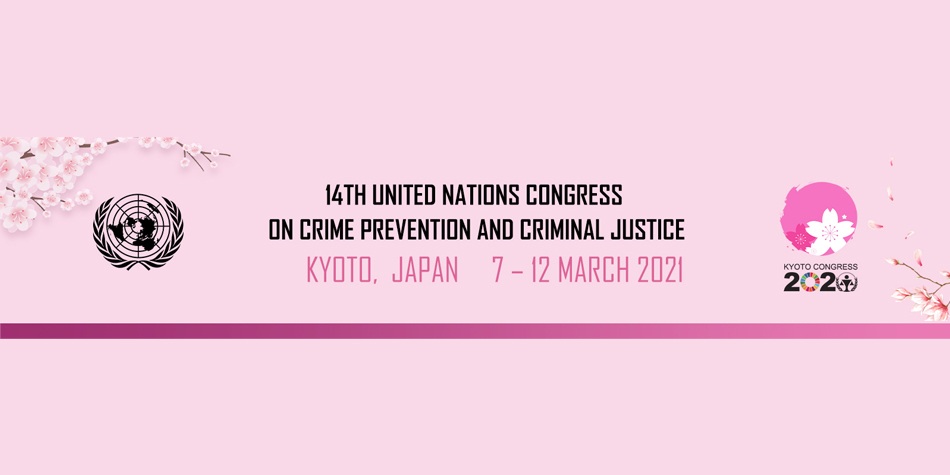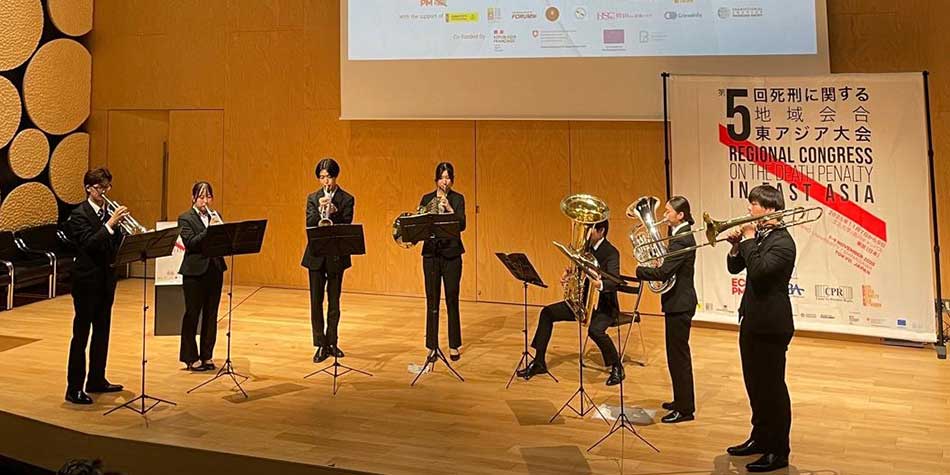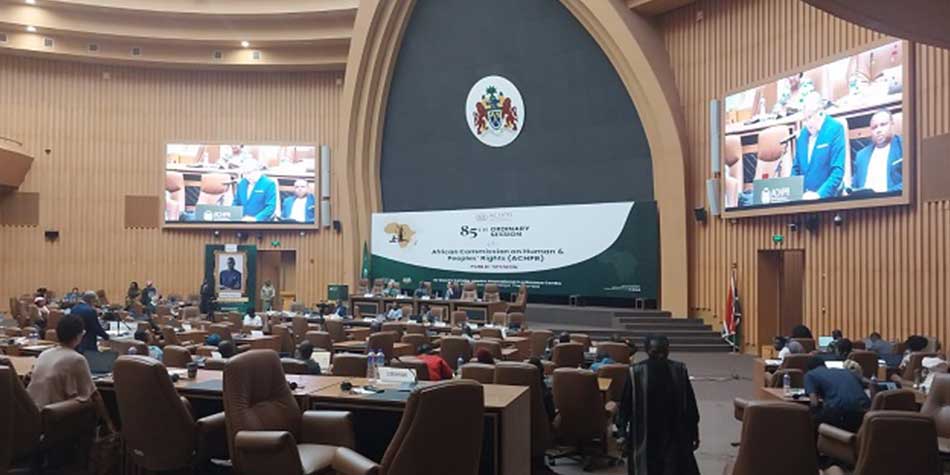
Recapping the UN Crime Congress in Kyoto
Advocacy
The United Nations Congress on Crime Prevention and Criminal Justice was held in Kyoto, Japan from 7 to 12 March 2021.
The event was initially scheduled to be held in April 2020 but was postponed due to the outbreak of COVID-19. The re-structured Congress, a six-day session instead of the original eight days, was the first in its history to occupy a hybrid format, with very limited in-person participation in Kyoto and large online participation. All participants, including those who had already registered for the original dates of the Congress, were required to register again via the United Nations registration platform, “INDICO”. Additionally, participants were informed by the UNODC secretariat just a few weeks before the Congress that no in-person audience would be allowed at any ancillary meetings, which caused confusion for many Japanese lawyers who planned to attend the venue. Though some were concerned that the conference might not be well attended due to this complicated registration process, a total of 5,600 people from 152 countries are participating, with some 4,200 registered to attend virtually and over 160 sessions, including ancillary meetings, were organised covering a wide range of topics from wildlife, cybercrime and human trafficking to the death penalty.
Since the last UN Crime Congress in Doha in 2015, Japan has faced challenges on criminal justice. It carried out mass executions against members of the Aum Shinrikyo cult group in 2018 and was forced to confront with the James Bond-like escape of Carlos Ghosn in 2019 – the former president of Nissan. Japanese civil society has attempted to raise international awareness of its death penalty and “hostage justice” system, in which suspects can be held for a long period of time in harsh conditions without the presence of defence counsel, particularly after Japan was determined to host the next Congress. This note explores the outcome of the Kyoto Congress and the attitudes of Japanese civil society towards it, after briefly overviewing its role and this year’s theme.
What is the UN Crime Congress? Its role and this year’s theme
The UN Crime Congress is the world’s largest and most diverse conference of policy-makers, practitioners, academia, intergovernmental organisations and civil society in the field of crime prevention and criminal justice. It has been held every five years since 1955 in different parts of the world, dealing with a vast array of topics. One of the most significant areas of work for the UN Crime Congress would be the UN Standard Minimum Rules for the Treatment of Prisoners (SMR), which was adopted at the first UN Crime Congress in 1955. The SMR was revised for the first time in 60 years in 2015, and the revised SMR is now known as the ‘Nelson Mandela Rules’ to honour the legacy of the late President of South Africa. Apart from this, the Congress has played an important role in the field of criminal justice, including the adoption of the Basic Principles on the Role of Lawyers in 1990.
The overall theme of this year’s Crime Congress was “Advancing crime prevention, criminal justice and the rule of law: towards the achievement of the 2030 Agenda”. The 2030 Agenda for Sustainable Development includes 17 Sustainable Development Goals (SDGs) – an urgent call for action by all countries in a global partnership. As Goal 16 of the SDGs promotes peaceful and inclusive societies for sustainable development by providing access to justice for all and building effective, accountable and inclusive institutions at all levels, the Agenda Items of the Congress contained the rule of law, access to justice for all and building effective, accountable and impartial institutions.
What did civil society do for the Kyoto Congress?
In spite of the global trend toward the abolition of the death penalty, a recent survey has identified that more than 80% of people support the death penalty in Japan. The Japanese government has continued to perform executions – even if inmates are seeking retrial – backed with overwhelming support. Japan has been deepening confrontations with the international community on matters of criminal justice. Ignoring international concern over looming mass executions, the Ministry of Justice proceeded with them in July 2018. The executed inmates were members of the Aum Shinrikyo cult group, which had committed a deadly chemical attack in 1995. The Aum Shinrikyo cult group released sarin gas in the Tokyo underground on 20 March 1995, killing 13 people and injuring more than 6,000. On 6 July 2018, the government executed seven members who had been on death row, including the founder Shoko Asahara. The remaining six members were put to death 20 days later. This was the first time that so many prisoners had been executed in one day since the government began in 1989 to publicise the number of inmates executed. As the scale of the executions – 13 within three weeks – was the largest since the Second World War, they appeared in the headlines of much of the mass media.
In the meantime, the Japan Federation of Bar Associations (JFBA) made efforts to put the issue of the death penalty on the agenda of the Kyoto Congress. It adopted a declaration in 2016 stating that it was aiming to abolish the death penalty by 2020, when the UN Crime Congress was to be held in Japan. It subsequently adopted “Opinion on Matters to Be Included in the Kyoto Declaration at the 14th United Nations Congress on Crime Prevention and Criminal Justice” in April 2019. In their opinion, the JFBA recommended that the outcome document of the Kyoto Congress should include the global abolition of the death penalty and a moratorium on executions until it was abolished. Unlike the UN Human Rights Council, the chances of the death penalty being raised at the Congress was said to be slim, but the JFBA continued its efforts to raise the issue in light of the fact that Japan – one of the few countries which carries out executions every year – hosts the Congress.
During or prior to the six-day Crime Congress, many organisations held events about the death penalty and released statements. The JFBA organised its ancillary meeting on the death penalty, co-sponsored by the Union Internationale des Avocats (UIA), Australian Embassy and the Delegation of the European Union to Japan, as well as hosting a parallel symposium on the death penalty outside the Congress. At the end of the symposium, the JFBA, UIA and the Delegation of the European Union to Japan released a “Joint Message to Aim for the Abolishment of the Death Penalty in All Countries and Regions of the World”. They called on “the world, and particularly on the governments and legislative bodies of those few countries that still retain the death penalty system and the even fewer that carry out executions” to actively move toward abolition, stating “[w]e should not lose sight of the fact that even criminals are human beings”. Apart from this statement, the non-governmental organisation groups including the Amnesty International and the World Coalition Against the Death Penalty released a joint statement entitled “UN Crime Congress: abolition of the death penalty must be an integral part of crime prevention programmes and criminal justice reforms” in advance of the Congress.
What was adopted at the Kyoto Congress? And what is next?
At the fourteenth UN Crime Congress, the Kyoto Declaration was passed by acclamation on 7 March 2021. The Kyoto Declaration provides several actions that State parties endeavour to take. It includes “[i]mproving prison conditions” in accordance with the United Nations Standard Minimum Rules for the Treatment of Prisoners (the Nelson Mandela Rules) and the United Nations Rules for the Treatment of Women Prisoners and Non-custodial Measures for Women Offenders (the Bangkok Rules). It also calls for “[r]educing reoffending through rehabilitation and reintegration” by fostering inter-agency coordination among relevant government authorities, such as employment and social welfare agencies and local governments, as well as public-private partnerships between those authorities and the community, including cooperating employers and community volunteers who support the long-term and social reintegration of offenders;. However, it does not mention the death penalty. Our initial goal of abolishing the death penalty in Japan was not achieved. Despite this, it was significant that the JFBA collaborated with abolitionist governments and international bar organisations such as the UIA toward the common challenges of global abolition.
The host country of the next Crime Congress is to be Kazakhstan – a country which ratified the second optional protocol to the ICCPR this year. Let us hope that Japanese civil society, including the JFBA, will fight together with the international community to abolish the death penalty, drawing on the friendships formed through the Kyoto Congress.
Read more with Penal Reform International or FIDH
Categories
Public Opinion






